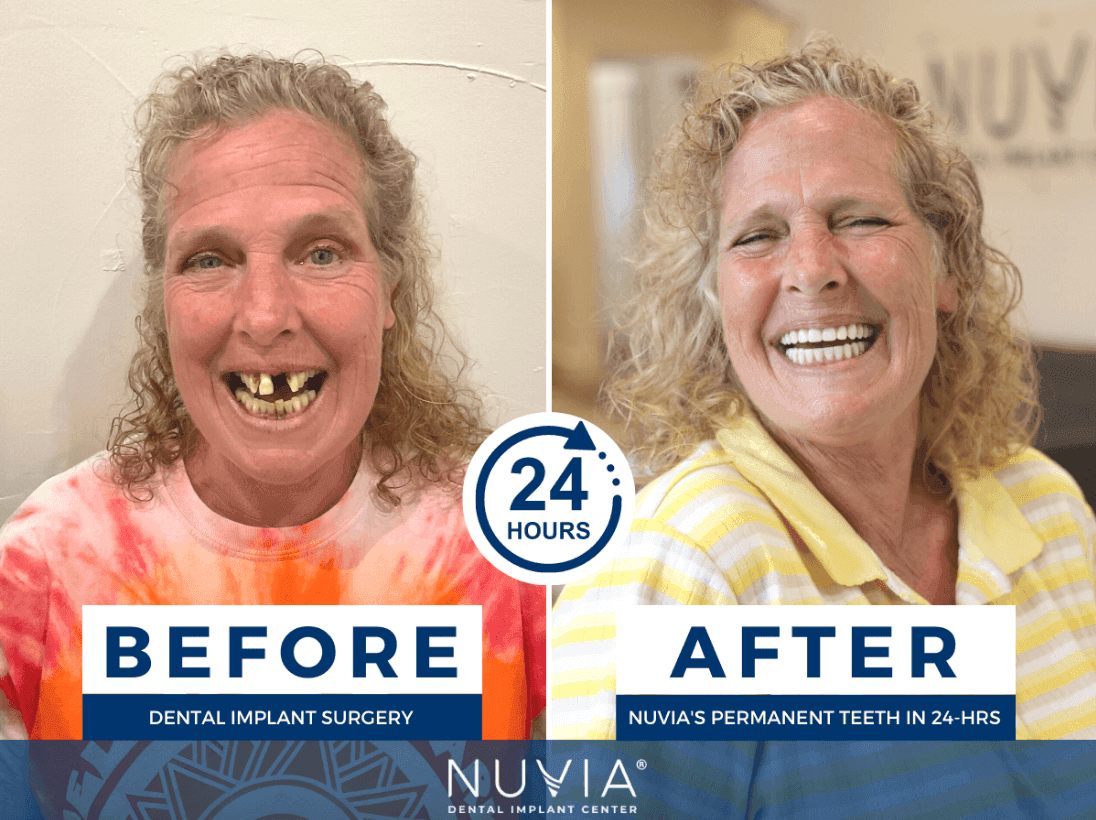Dental implants have transformed dentistry by providing a durable and aesthetically pleasing solution for replacing missing teeth. Among these options, Nuvia dental implants stand out due to their unique promise of delivering permanent teeth in as little as 24 hours. This article will thoroughly compare the costs of Nuvia dental implants with traditional implants, taking into account various factors such as material quality, longevity, and overall patient satisfaction. By understanding these differences, patients can make informed decisions about their dental care options.
What Are Dental Implants?
Dental implants are artificial tooth roots made from durable materials like titanium or zirconia, surgically placed in the jawbone to replace missing teeth. They serve as a stable foundation for both fixed and removable replacement teeth, designed to blend seamlessly with your natural smile.
The process involves osseointegration, where the implant fuses with the jawbone over time, providing long-lasting support.

Key Components of a Dental Implant:
- Implant Body: A metal screw that integrates with the jawbone, providing long-term stability.
- Abutment: A connector piece that securely holds the crown in place.
- Crown: The visible, custom-designed part of the tooth that mimics the appearance and function of a natural tooth.
Dental implants not only restore functionality but also enhance oral health by preventing bone loss in the jaw, making them a preferred choice for tooth replacement. Proper care includes regular brushing, flossing, and dental check-ups to ensure their longevity.
Traditional Dental Implants: A Comprehensive Guide

Traditional dental implants are a reliable solution for tooth replacement, involving a detailed multi-step process that ensures durability and functionality. Here’s an overview of the key stages:
Initial Consultation: A thorough assessment of oral health, including X-rays and bone density evaluation, to determine candidacy for implants.
Implant Placement: Surgical insertion of a titanium or zirconia implant into the jawbone, serving as a sturdy foundation for the replacement tooth.
Healing Period: During this critical phase known as osseointegration, which typically lasts 3-6 months, the bone integrates with the implant, providing stability for long-term use.
Abutment Placement: Attaching the abutment, which connects the implant to the crown.
Crown Placement: Securing a custom-made crown that mimics the appearance and function of a natural tooth.
Cost Factors for Traditional Implants
The cost of traditional dental implants varies based on several factors:
Geographic Location: Prices fluctuate depending on the region and local economic conditions.
Number of Implants: Multiple implants increase overall costs.
Additional Procedures: Bone grafts or sinus lifts may be necessary when there is insufficient bone structure, adding $500 to $5,000 to total costs.
Materials Used: Titanium is standard; zirconia offers aesthetic benefits at a higher cost.
Dentist’s Expertise: Experienced implantologists may charge premium fees for their specialized skills.
Average Cost of Traditional Implants
On average, a single traditional dental implant costs between $3,000 and $5,000, covering the implant, abutment, and crown. For full-mouth restorations or advanced techniques like All-on-4 procedures, costs range from $20,000 to $50,000 per arch, depending on complexity.
By understanding these factors—including potential complications like infection or implant failure—patients can make informed decisions about their dental implant journey while planning for effective aftercare during recovery.
Nuvia Dental Implants: A Revolutionary Solution
Nuvia dental implants redefine convenience and efficiency by delivering permanent teeth within just 24 hours post-surgery. This groundbreaking approach minimizes treatment time while maximizing patient comfort and satisfaction.

The Nuvia Process
- Initial Consultation: A comprehensive evaluation of oral health and bone structure, akin to traditional implant procedures.
- Implant Placement: Implants are strategically placed in a single, streamlined surgical session.
- Immediate Teeth: Permanent zirconia teeth are securely attached within 24 hours, eliminating the inconvenience of temporary dentures.
Cost Factors for Nuvia Implants
Several elements influence the cost of Nuvia dental implants:
- Number of Implants: More implants typically result in higher costs.
- Material Choice: Nuvia’s use of durable zirconia for permanent teeth can be pricier than titanium alternatives.
- Geographic Location: Costs vary depending on the Nuvia center’s location.
- Additional Procedures: Preparatory treatments like bone grafts may add to the overall expense.
Average Cost of Nuvia Implants
- Single Implant: $3,500 to $5,000.
- Full Mouth Restoration: $25,000 to $50,000, contingent on case complexity and implant quantity.
Eligibility and Recovery
Patients should consult with their dentist to determine eligibility for this innovative procedure. Post-operative care includes guidelines on diet and activity restrictions during recovery, typically lasting a few weeks.
Nuvia’s innovative process and premium materials ensure a lasting, natural-looking smile while providing essential support throughout your journey. With ongoing advancements in technology and patient care, many individuals find renewed confidence in their smiles after choosing Nuvia.
Comparing Costs: Nuvia vs. Traditional Implants
When evaluating the costs of Nuvia dental implants against traditional options, several critical factors emerge:
Initial Costs
- Traditional Implants: $3,000 to $6,000 per implant.
- Nuvia Implants: $3,500 to $5,000 per implant.
Full Mouth Restoration
- Traditional Implants: $43,000 to $56,000.
- Nuvia Implants: Typically ranges from $20,000 to $30,000 depending on individual needs and location.
Additional Costs
- Traditional Implants: Often involve extra expenses for procedures like bone grafts, sinus lifts, and multiple appointments.
- Nuvia Implants: Typically include all necessary procedures in the quoted price, minimizing additional costs due to their streamlined process.
Time and Convenience
- Traditional Implants: The process can span several months with multiple visits required for consultations and healing.
- Nuvia Implants: Deliver permanent teeth within 24 hours, allowing patients to enjoy immediate functionality while significantly reducing treatment time.
In addition to these cost considerations, it’s important to note that many insurance plans may not cover Nuvia implants fully; therefore, checking with your provider is advisable. By offering a faster, more inclusive solution that promotes better oral health through bone preservation and stability, Nuvia implants stand out as a compelling choice for those seeking dental restoration.
Value and Long-Term Considerations
Although the upfront cost of Nuvia implants may appear higher, their overall value often exceeds that of traditional options due to reduced treatment time and fewer additional procedures. Nuvia implants utilize premium zirconia, a material known for its superior aesthetics and durability compared to conventional titanium implants. However, while zirconia offers many advantages, it is essential to note that it may not be suitable for all patients due to its higher cost and varying long-term performance compared to titanium options.
Longevity and Maintenance
With proper care, both Nuvia and traditional implants can last for decades. Maintaining good oral hygiene—such as brushing twice daily and flossing regularly—along with routine dental check-ups is critical for ensuring their longevity and preventing complications. Patients should also be aware that while zirconia is resistant to fractures and wear, it requires careful handling during cleaning to avoid damage.
Patient Satisfaction
Patient feedback is vital when evaluating dental implants. Nuvia implants have garnered praise for their swift turnaround times and exceptional results; however, some users have expressed concerns regarding the fit and comfort of the implants. These insights emphasize the importance of personalized consultations to ensure each patient’s unique needs are met effectively.
Conclusion
Choosing between Nuvia dental implants and traditional implants depends on various factors, including cost, convenience, and personal preferences. While traditional implants have a long track record of success, Nuvia offers a faster and potentially more convenient solution with its 24-hour permanent teeth. Patients should consult with their dental professionals to determine the best option for their specific needs and circumstances.
With proper care, Nuvia Dental Implants can last a lifetime, offering a durable and long-term solution for missing teeth.
The procedure involves anesthesia, ensuring minimal discomfort during implantation. Post-surgery, patients may experience mild discomfort, typically managed with prescribed pain medication.
Nuvia Dental Implants boast a high success rate, comparable to traditional implants, thanks to their advanced technology and materials.
While most adults are candidates for dental implants, individual suitability depends on factors like oral health, bone density, and overall medical condition.
Recovery time varies, but many patients resume normal activities within a few days. Complete healing and fusion with the jawbone can take several months.
The cost of a single Nuvia dental implant typically ranges from around $3,500 to $5,000. This cost can vary depending on several factors such as the number of teeth being replaced, the type of implant, and the clinic’s location. In comparison, the cost of a traditional dental implant can range from $1,000 to $3,000, with the abutment and the crown adding an additional $500 to $3,000.
While Nuvia dental implants may have a higher upfront cost, they are designed to be a long-lasting solution, potentially making them more cost-effective in the long run. Traditional implants, while generally cheaper initially, may require additional costs over time for maintenance and potential replacement.
Dental implant procedures, including those from Nuvia, are often not covered by insurance as they are considered elective or cosmetic treatments. Some insurance plans may provide partial coverage for certain aspects of the implant procedure, such as the crown or abutment, but the implant itself may not be included in the coverage.
Several factors can influence the cost of Nuvia dental implants. These include the number of implants required, the condition of the patient’s jawbone, and whether additional procedures such as bone grafting, sinus lifts, or ridge augmentation are needed.
The cost of full mouth Nuvia dental implants can vary greatly depending on the individual patient’s needs and the specific procedure used. In comparison, the cost of traditional full mouth dental implants can range from $1,500 to $30,000, and can even go as high as $50,000 depending on the specific case and the dentist performing the procedure.















